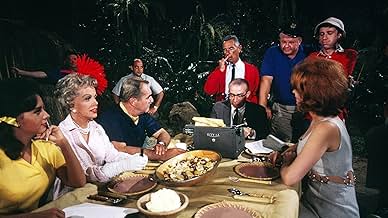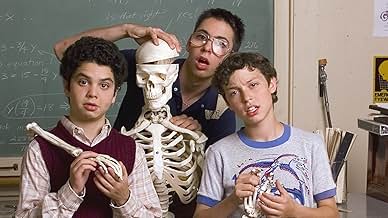Riunire il pubblico con i personaggi televisivi con cui sono cresciuti introducendo commedie che saranno sicuramente seguite.Riunire il pubblico con i personaggi televisivi con cui sono cresciuti introducendo commedie che saranno sicuramente seguite.Riunire il pubblico con i personaggi televisivi con cui sono cresciuti introducendo commedie che saranno sicuramente seguite.
- Premi
- 1 candidatura in totale
Sfoglia gli episodi
Recensioni in evidenza
This is an excellent and thorough examination of many of the most popular sit-coms and how the medium - unique in its widespread influence - interacts with society. The episodes are watchable and light, due to the presentation consisting of quickly interspersed clips of the sitcoms themselves, news clips showing life outside the TV, and interviews with people who have devoted their entire lives to the industry (sometimes from childhood).
I appreciate how it looks at the whole history within each episode, focusing on a particular facet of society (family, work, sex, race, etc.). The viewer is able to join actors, writers, producers, and critics of the shows we've all grown up with and hear stories explaining how the paths of shows were forged and how current entertainment is related to the very different earliest shows of 70 years ago.
People who don't like the diversity being explored in society today - and therefore within up-to-date popular culture - might not appreciate the value of this. This documentary series is acknowledging the ways our world has changed, not politicizing (unlike many of the reviews listed here). It's a valuable contribution to the history of popular culture.
I appreciate how it looks at the whole history within each episode, focusing on a particular facet of society (family, work, sex, race, etc.). The viewer is able to join actors, writers, producers, and critics of the shows we've all grown up with and hear stories explaining how the paths of shows were forged and how current entertainment is related to the very different earliest shows of 70 years ago.
People who don't like the diversity being explored in society today - and therefore within up-to-date popular culture - might not appreciate the value of this. This documentary series is acknowledging the ways our world has changed, not politicizing (unlike many of the reviews listed here). It's a valuable contribution to the history of popular culture.
With a series like this they could have done a marvelous job talking about society, the business, the actors, the networks, etc. Instead they do a half-based job on everything. Why do it?
What should have been a fun and light hearted look back, with minimal social commentary sadly turned into a cringeworthy and often irrelevant , inaccurate over analysis that took all the air out of the balloon.
Rather too many people attempting to apply their on rather faulty and false social ethics to history that often simply made comedy for what it as, something to laugh at and with.
Many of these people had little or no direct involvement in the actual comedy creation process.
It seems as if CNN management sat round a table with a white board full of all the latest terms and words that had to be included in order to fulfil some false sense of diversity and wokeness.
But in the end, it delivered too much that made the viewer roll eyes, tut and sigh.
I tried so hard to look past the faux commentary and.enjoy reliving some moments from my past but the final straw came when Margaret Cho spoke of cultural appropriation and misogyny, not having a clue what each actually means and with such an airy tone that looked down upon the audience.
It is so ironic that what should be a celebration of comedy was too often used as an excuse to over analyse, make wholly subjective assumptions, presented as fact and completely forget the whole point of the exercise.
One of the frequent contributors was the editor in chief of the A. V. Club, that has a tagline 'Pop culture obsessives writing for the pop culture obsessed'.
Obsessed is correct but sadly, all the obsession has clouded the brain so much that the neurons cannot be seen for the grey matter.
Rather too many people attempting to apply their on rather faulty and false social ethics to history that often simply made comedy for what it as, something to laugh at and with.
Many of these people had little or no direct involvement in the actual comedy creation process.
It seems as if CNN management sat round a table with a white board full of all the latest terms and words that had to be included in order to fulfil some false sense of diversity and wokeness.
But in the end, it delivered too much that made the viewer roll eyes, tut and sigh.
I tried so hard to look past the faux commentary and.enjoy reliving some moments from my past but the final straw came when Margaret Cho spoke of cultural appropriation and misogyny, not having a clue what each actually means and with such an airy tone that looked down upon the audience.
It is so ironic that what should be a celebration of comedy was too often used as an excuse to over analyse, make wholly subjective assumptions, presented as fact and completely forget the whole point of the exercise.
One of the frequent contributors was the editor in chief of the A. V. Club, that has a tagline 'Pop culture obsessives writing for the pop culture obsessed'.
Obsessed is correct but sadly, all the obsession has clouded the brain so much that the neurons cannot be seen for the grey matter.
I would love to see a really good history of the sitcom without all the same players. Of course they were vital , but this series brushes over the 50's and naturally spends most of its time on I Love Lucy. So many other shows that could be explored. They drag Norman Lear, Suzanne Somers, Eric McCormick out to expound and naturally we once again visit, Maude, Good Times, Modern Family ad nauseam.
The sitcom is a special art, a half hour format whose style comes from that 2/ minutes of entertainment.
Sex and the City, Fleabag, and others mentioned are not sitcoms. This ruined the whole premise of the show. So far, very bored.
The sitcom is a special art, a half hour format whose style comes from that 2/ minutes of entertainment.
Sex and the City, Fleabag, and others mentioned are not sitcoms. This ruined the whole premise of the show. So far, very bored.
The content of this show is interesting, which is why I rated it as highly as I did. Unfortunately, from the first 5 minutes of episode 1, the series is decidedly hard left, which is so unnecessary. Who wants to hear smug talking heads pontificate on how bad sitcoms were in the 50's, 60's, and 70's, because all the shows were about White people?
The hard left focus was a bit of a surprise to me, as I had seen CNN documentary series in the past, like the ones of the decades (e.g., 60's, 70's, 80's, 90's) as well as their History of Comedy series, and they were all pretty much down-the-middle without an overt political agenda. Why they chose to have such a strong progressive point of view for this series is sad, and shows how much CNN has drank the Kool-Aid.
Episode 2, ostensibly about the evolution of showing sex on sitcoms was instead about 75% about the plight of LGBTQ. In episode 3, "Friends" co-creator Marta Kauffman had to apologize on camera for all the main characters being White.
Normally, I would wait until I had seen the entire series, but now that I've seen six of the eight episodes, my opinion is already baked in. I look forward to watching the final two episodes and learning more about how straight White men are the bane of human existence...and the TV sitcom.
The hard left focus was a bit of a surprise to me, as I had seen CNN documentary series in the past, like the ones of the decades (e.g., 60's, 70's, 80's, 90's) as well as their History of Comedy series, and they were all pretty much down-the-middle without an overt political agenda. Why they chose to have such a strong progressive point of view for this series is sad, and shows how much CNN has drank the Kool-Aid.
Episode 2, ostensibly about the evolution of showing sex on sitcoms was instead about 75% about the plight of LGBTQ. In episode 3, "Friends" co-creator Marta Kauffman had to apologize on camera for all the main characters being White.
Normally, I would wait until I had seen the entire series, but now that I've seen six of the eight episodes, my opinion is already baked in. I look forward to watching the final two episodes and learning more about how straight White men are the bane of human existence...and the TV sitcom.
Lo sapevi?
- ConnessioniReferenced in Late Night with Seth Meyers: Amy Poehler/Joseph Gordon-Levitt/Kevin Smith (2021)
I più visti
Accedi per valutare e creare un elenco di titoli salvati per ottenere consigli personalizzati
- How many seasons does History of the Sitcom have?Powered by Alexa
Dettagli
- Data di uscita
- Paese di origine
- Sito ufficiale
- Lingua
- Celebre anche come
- L'histoire des sitcoms
- Azienda produttrice
- Vedi altri crediti dell’azienda su IMDbPro
Contribuisci a questa pagina
Suggerisci una modifica o aggiungi i contenuti mancanti
































